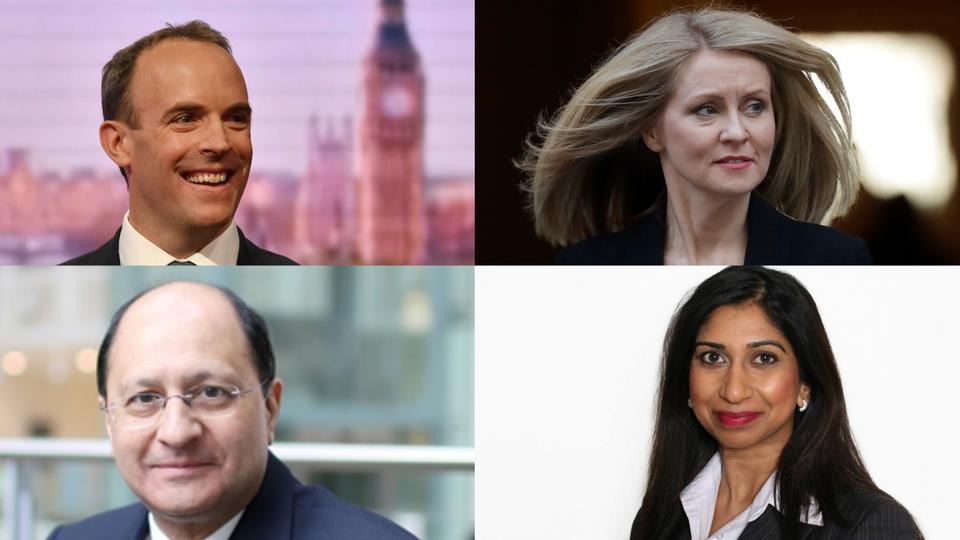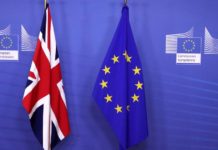Brexit threatened as four UK ministers quit
UK Prime Minister Theresa May’s EU divorce deal is in trouble after two cabinet ministers and two junior ministers quit on Thursday. The resignations came as EU chief Donald Tusk called a summit for November 25 to ratify the draft agreement.

Four British ministers, including Brexit Secretary Dominic Raab, resigned on Thursday in opposition to the divorce deal struck by Prime Minister Theresa May with the EU. The resignations are a major blow to her authority and her ability to get the deal through parliament.
The other three resignations were cabinet minister Esther McVey who is Work and Pensions Secretary, junior Northern Ireland minister Shailesh Vara and Suella Braverman, who is junior Brexit minister.
A defiant May addressed parliament soon after the departures, saying Brexit meant making “the right choices, not the easy ones” and urged lawmakers to support the deal “in the national interest.”
“The choice is clear,” May told lawmakers. “We can choose to leave with no deal. We can risk no Brexit at all. Or we can choose to unite and support the best deal that can be negotiated — this deal.”
But the resignations, less than a day after the Cabinet collectively backed the draft divorce agreement, weakens May and is likely to embolden her rivals within her Conservative Party. A leadership challenge is being openly discussed.
“I cannot in good conscience support the terms proposed for our deal with the EU,” Raab said in a resignation letter to the prime minister.
“I cannot reconcile the terms of the proposed deal with the promises we made.”
Raab is the second Brexit Secretary that May has lost — David Davis, who like Raab backed Brexit in the U.K.’s June 2016 referendum on its membership of the EU, quit in July of this year.
Work and Pensions Secretary Esther McVey followed Raab out the door. She said in a letter that it is “no good trying to pretend to [voters] that this deal honours the result of the referendum when it is obvious to everyone that it doesn’t.”
The departures are a further sign that many supporters of Brexit won’t back May in a vote in Parliament on the deal. That’s prompted a big fall in the value of the British pound, which was trading 1.5 percent lower at $1.28 after the news.
TRT World’s Sarah Morice has more.
Vassal state
Pro-Brexit politicians say the agreement, which calls for close trade ties between the UK and the bloc, would leave Britain a vassal state, bound to EU rules that it has no say in making.
Before Parliament votes on the deal — the culmination of a year and a half of negotiations between the two sides — EU leaders have to give their backing.
Earlier on Thursday, EU chief Donald Tusk called for a summit of leaders to take place on November 25 so they can rubber-stamp the draft deal reached by officials earlier this week.
May has supporters in her party, and they argued Thursday that the alternatives — leaving the trading bloc without a deal or a second vote on Brexit — were not realistic options.
“‘No deal’ is not pretty,” Health Secretary Matt Hancock told BBC Radio 4. “A second referendum would be divisive but not be decisive.”
‘Dead on arrival’
But May’s chances of getting her deal through Parliament appeared to be shrinking. Her Conservative government doesn’t have enough lawmakers of its own to get a majority, and relies on the support of the Democratic Unionist Party from Northern Ireland, which says it will not back the deal.
Opposition parties also signaled that they would vote against the agreement if it comes before them — most likely in December.
Main opposition Labour Party leader Jeremy Corbyn said May should withdraw the “half-baked” Brexit deal. He said Parliament “cannot and will not accept a false choice between this deal and no deal.”
Ian Blackford, who heads the Scottish National Party in Parliament, said the deal was “dead on arrival” and urged May to stop the countdown clock to Britain’s exit, less than five months away.
“Do the right thing and we will work with you,” he said. “Stop the clock and go back to Brussels.”
Meanwhile in Brussels, Tusk heaped praise on the EU’s Brexit negotiator, Michel Barnier, who had “achieved the two most important objectives” for the bloc — limiting the damage caused by Britain’s impending departure and maintaining the interests of the other 27 countries that will remain in the EU after Brexit.
“As much as I am sad to see you leave, I will do everything to make this farewell the least painful possible for both for you and for us,” said Tusk, who in his role as European Council President chairs the meetings of leaders.
The deal also requires the consent of the European Parliament as well as the British one and on Thursday Barnier was set to travel to Strasbourg, France, to win over legislators there. The parliament’s chief Brexit official, Guy Verhofstadt, has already welcomed the draft withdrawal agreement late Wednesday.
But over the coming weeks, the British Parliament will be the focal point of the Brexit process. The deal has to be backed by a majority of lawmakers so Britain can leave the EU on March 29, 2019.
What they said
Dominic Raab – Brexit Secretary: “I cannot reconcile the terms of the proposed deal with the promises we made to the country in our manifesto at the last election … This is, at its heart, a matter of public trust.” “No democratic nation has ever signed up to be bound by such an extensive regime, imposed externally without any democratic control over the laws to be applied, nor the ability to decide to exit the arrangement.”
“That arrangement is now also taken as the starting point for negotiating the Future Economic Partnership.”
“If we accept that, it will severely prejudice the second phase of negotiations against the UK.”
Esther McVey – welfare minister: accused the prime minister of failing to honour the result of the 2016 referendum vote to leave the EU.
Shailesh Vara – junior Northern Ireland minister: the Draft deal will leave the UK “in a half-way house with no time limit on when we will finally be a sovereign nation.”
Suella Braverman – junior Brexit minister said the proposed divorce deal was not what the British people voted for and risked breaking up the United Kingdom.
Jeremy Corbyn – leader of the opposition Labour Party: “The withdrawal agreement and the outline political declaration represent a huge and damaging failure … The government … is in chaos.”
EU: “We need to prepare ourselves for the possibility of a ‘no-deal’ Brexit,” French Prime Minister Edouard Philippe said. “It will escape no one that the current political situation in Britain could fuel uncertainty … over the ratification of the accord.”










